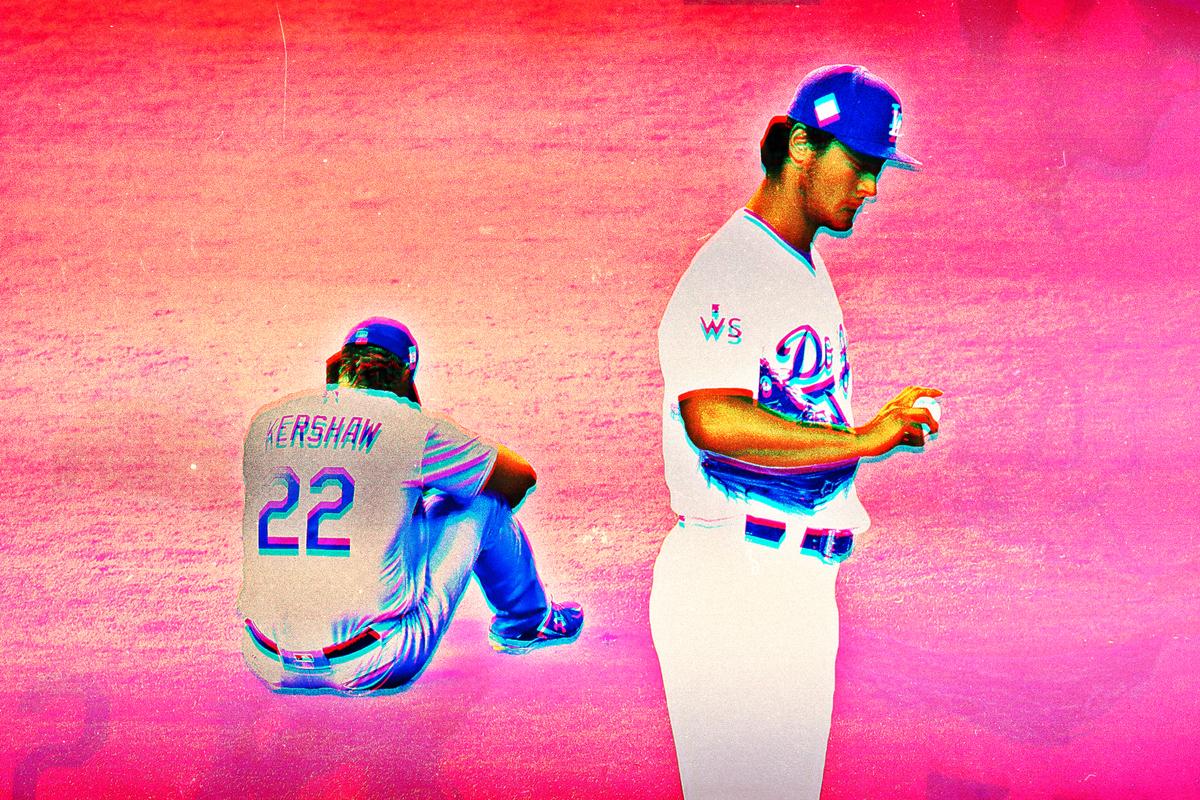Has the Astros Scandal Changed How We Think of Yu Darvish and Clayton Kershaw?
For Darvish, his starts in the 2017 World Series were among the worst of his career. For Kershaw, the series was another knock on his questionable postseason résumé. But does the revelation that the Astros were stealing signs affect any of that?
On October 31, 2017, the Los Angeles Dodgers were returning home to face an elimination game in the World Series. The team had just dropped two of three games in Houston, including a wild 13-12 Game 5 loss in extra innings that seemed to belong to the Dodgers from the jump. Los Angeles survived Game 6 to even up the series, setting up the chance to win the title for the first time in 29 years in front of their home crowd. Despite coming off the worst start of his professional career in a Game 3 disaster, Yu Darvish was handed the ball by Dave Roberts, a decision that would come to haunt Dodgers fans.
Darvish gave up a double to George Springer on just the third pitch of the game. Eight pitches later, the Astros were up two runs. The next time Springer stepped up to the plate in the following inning, with two outs and a man on third, he sent a screeching line drive to the left-center-field stands. Just like that, the Dodgers were down five, and Darvish’s night was over.
After Brandon Morrow finished off the frame, Clayton Kershaw took the reins. Coming off that extra-innings loss just three days prior, in which Kershaw gave up six runs over 4 2/3 innings, the left-hander retired the side in order. He went on to deliver three more shutout innings, allowing just two hits and two walks. But by then, the damage was already done. The Astros went on to win the game 5-1 to finish off the series and claim the Commissioner’s Trophy in front of a crowd of 54,000-plus fans at Dodger Stadium.
You can probably tell where this is going.
A report by The Athletic last November revealed that Houston had used a combination of electronic equipment and trash cans to relay opposing teams’ signs to its batters during games at Minute Maid Park in the 2017 regular season. MLB’s subsequent investigation found that the scheme carried on throughout the postseason, and that while the trash-can banging stopped in 2018, the Astros continued using their replay room’s video to decode and transmit catcher signs. Pitching careers, salaries, service time—the list goes on for all the potentially harmful effects the Astros’ sign stealing had on baseball in the 2017 season and beyond, but no one felt it on a bigger stage than the Los Angeles Dodgers in that World Series.
It’s unclear just how much damage the Astros caused by stealing signs from opposing teams, since we don’t know exactly which plays were directly affected by it, or even how effective the scheme proved to be for a team that was already undoubtedly talented. Ask around and you’ll hear varying opinions on the matter, but in all cases, fans, media, and players unanimously agree that the lengths that Houston went to gain an edge was both wrong and hurtful to the integrity of the sport. The news now raises questions about just how good that title team was and if all the accolades they attained still hold any merit. That piece of metal may still belong to the Astros, but the legacies of that series and those who played in it will be forever questioned. For the Dodgers, that applies to perhaps no one more than Yu Darvish and Clayton Kershaw.
In the aftermath of the 2017 World Series, Dodgers fans and the media alike agreed that one player was largely to blame for Los Angeles’s devastating loss: Darvish. The Japanese right-hander posted a 21.60 ERA across two starts, lasting only 1 2/3 innings each, the shortest starts of his career.
Bill Plaschke, a Los Angeles Times columnist since 1996 and a longtime panelist on ESPN’s Around the Horn, was one of the pitcher’s many critics at the time. In a January 2018 column about Darvish, who was then a free agent, Plaschke wrote: “[Dodgers executives] Andrew Friedman and Farhan Zaidi are out of their brilliant minds if they think there’s any way Yu Darvish should be allowed to again wear a Dodgers uniform.”
“To come in there in Game 3 and have what happened to him, we immediately called him scared, we called him weak,” Plaschke said in a phone interview last month. “Darvish was the number one villain in my eyes in that series out of L.A.”
What was most surprising about those two World Series starts was that Darvish—who had been sent over to the Dodgers in a deadline trade with the Texas Rangers that season—had been pitching well leading up to it. In his last three starts of the regular season, he posted an 0.47 ERA over 19 1/3 innings, striking out 21 batters while walking just one. In the first two rounds of the postseason, he picked up wins in both of his starts, allowing just two runs over 11 1/3 innings while striking out 14 batters and allowing only one walk. But in Game 3, playing away at Minute Maid Park in his first World Series start ever, something changed for Darvish.
“I thought he wasn’t ready for the moment, and that’s what we wrote,” Plaschke says. “As it turns out, he might’ve been ready, but the Astros were even more prepared.”
Whether because of the aid of sign stealing or not, Astros hitters were seeing everything Darvish was throwing. Not only was it the first time in his career that he failed to get a strikeout in an outing, but Darvish managed only one swinging strike in 49 pitches—23 of which were sliders or cutters. Darvish leads all qualifying pitchers in MLB history in strikeouts per nine innings (11.1).
It’s impossible to tell whether Darvish’s brutal performance was due to the Astros’ sign stealing, slick baseballs, nerves, or, most likely, some combination of them all. Not long after the series ended, reports began surfacing about how Darvish might have been tipping his pitches in the World Series, allowing Astros hitters to get a jump on him without any need for sign stealing.
“We had conversations about that with Yu, trying to kind of pin it down,” Dave Roberts said of the reports during the 2017 winter meetings. “Obviously, we weren’t successful. I think that there’s something to that but there’s also a lot more, for me, to execution.”
And yet, in a Sports Illustrated Now interview with Alex Bregman in late 2017, the Astros third baseman rebutted the notion that Darvish had been guilty of this:
SI: And, of course, the slider pitch for Yu Darvish is really one of his most deadly. Be honest, was he tipping them a little bit?
Bregman: No, he wasn’t. Well, not that we knew of.
SI: ‘Cause you know the story is that Carlos Beltrán, his former teammate, may have given you the heads-up: That he moves his hand a little bit when it’s a breaking ball, and he doesn’t when it’s a fastball.
Bregman: See, we didn’t know that. I wish we would have. Now, Beltrán is the best in the business at that; he is the best in all of baseball at finding out different tips.
Of course, Bregman may have just disagreed with his teammates, but it seems significant that the Astros star would speak against Darvish’s pitch tipping with little to gain from it. Even today, with the details of the Astros’ sign stealing out in the public, Darvish himself is unsure whether his struggles were largely due to pitch tipping or Houston’s cheating.
Regardless of the source of Darvish’s disastrous Game 3 performance, the loss remains the same, and there was no sign stealing to blame at Dodger Stadium in Game 7. The revelation of an unfair advantage can’t change the series’ outcome, and it can’t change the immediate impact that loss had on Darvish’s career. A Dodgers victory in that Fall Classic could’ve altered Darvish’s impending free agency that offseason, and saved him from the backlash of a fan base that designated him as the series scapegoat or the increased scrutiny he faced in the years after.
“That’s the thing that gets lost in all of this: More important than just one year, or one season, or one October, it was their careers and their legacies,” says Plaschke. “They’ll never get that back. Darvish will never play in L.A. again, and he’ll never be cheered in L.A. again. That time, that moment, was lost forever.”
When it comes to Kershaw, the news of the Astros’ sign stealing further muddles what was already a complicated legacy. The Texas native was long considered the greatest pitcher of his generation: eight All-Star appearances, one Gold Glove Award, five ERA titles, three Cy Young Awards, one MVP, and the coveted but rarely achieved Triple Crown. But his postseason history has been a different story.
Jon Weisman, founder of Dodgers Thoughts and author of several books, including Brothers in Arms: Koufax, Kershaw, and the Dodgers’ Extraordinary Pitching Tradition, has been writing about the Dodgers for decades and has followed Kershaw’s career as closely as anybody.
“There’s a reason I put Koufax and Kershaw in the title of the book and on the cover,” Weisman said over the phone recently. “They are 1 and 1A in Dodger history in terms of stature, as far as I’m concerned.
“Kershaw absolutely has had the opportunities to cement himself as the supreme pitcher in Dodger history, even with—or maybe surpassing—Koufax,” Weisman continued. “The only thing that has been missing is the World Series title.”
Both before and after that 2017 World Series, Kershaw has failed to carry his regular-season dominance into October time and time again. The Dodgers have suffered season-ending losses behind Kershaw in the 2013 NLCS, 2014 NLDS, 2016 NLCS, and 2018 World Series. This past October, Kershaw blew a save in the series-deciding loss to the eventual champion Nationals in the NLDS.
“The negative narrative against him is so powerful that I don’t know what changes it until he wins a World Series, even with this knowledge,” says Weisman of Kershaw in the wake of the cheating scandal. “He’s basically a .500 pitcher, in an old-school sense, in the postseason against the best competition in the world. He has had dominant starts. And yet those just completely get forgotten, completely get ignored, whenever something goes wrong.”
In the 2017 World Series, Kershaw actually had a dominant performance in Game 1 at Dodger Stadium, which saw him allow just three hits and one earned run over seven innings, striking out 11 batters. And in Game 5, Kershaw was rolling through the first three innings, retiring the side in order in each frame.
The fourth inning was the turning point for Kershaw and the Houston offense. Carlos Correa doubled in a run, and Yuli Gurriel knocked a three-run homer the next at-bat to even the score. After the Dodgers reclaimed the lead and Kershaw picked up two quick outs to start the next inning, he walked consecutive batters, who would score off José Altuve’s home run after Kershaw’s exit.
In Game 5, Kershaw finished with more walks (three) than strikeouts (two) for the first time since 2010 and forced his fewest swings and misses (four) since 2012, according to SI’s Tom Verducci. In 51 sliders and curves total, Kershaw didn’t create one whiff.
Kershaw spoke to Verducci last month, and though he condemned the Astros’ cheating, he had no interest in examining the impact it had on his performance, taking responsibility for that Game 5 loss: “I just lost my command a little bit there in the fourth inning, and that’s all it took. I know it was a slider, but it must have stayed up because he put a really good swing on it.”
Just like with Darvish, there’s no way to really know how big of a role the Astros’ sign stealing played in Kershaw’s inability to hold separate four- and three-run leads in a game that served as the series’ inflection point. It’s worth noting that the lone loss the Astros conceded at home in the 2017 postseason was sandwiched between Game 3 and Game 5 in the World Series, a game in which Alex Wood had a strong start and Houston managed only two hits in a 6-2 loss. If Darvish and Kershaw both just didn’t pitch well in Houston, sign stealing or not, then credit largely due to the Astros hitters during those games gets unfairly diminished by the cheating as well. A beautiful irony in not knowing just how effective the sign stealing was for Houston’s hitters is the possibility that it could have been just as damaging to them as it was to opposing pitchers.
It still makes you wonder whether Kershaw’s best chance to claim that elusive championship was stolen away that year because the Astros took just enough of an edge to win a game that required extra innings.
“Kershaw was always going to have his statue built for him anyway; he was always going to be a Dodger forever,” Plaschke says. “But what this cost him was his place in Dodger history. He has that one World Series ring, that buys him credibility for the rest of his career.”
One of the many shames coming out of the news of the Astros’ cheating is that there are no real answers for players like Yu Darvish and Clayton Kershaw, or a Dodgers fan base still waiting for its title drought to end—only more questions and reopened wounds.
A few years have passed, and most players have changed or moved on. Darvish believes that he’s better off because of those World Series losses, and he has since reinvented himself, regained his confidence, and is coming off his best season in years. Except now, he pitches for the Cubs. Kershaw still has a chance to rewrite his postseason story in Los Angeles, with Mookie Betts and an improved Cody Bellinger there to guide him, but he’s no longer the same generational talent he once was, and his persistent back issues will continue to be a concern for the remainder of his career. Other Dodgers, like Kenta Maeda or Morrow—who both struggled on the mound in Game 5—play for other teams now, and Kenley Jansen, who gave up the losing run that game, is still searching for a title in Los Angeles. Andre Ethier, a Dodgers lifer, played his final game during that 2017 World Series, batting in Los Angeles’s lone run in Game 7.
“Before knowing any of this stuff that came out, the thing that bothered me was I feel that we played and did everything we could to win that series, and they kept coming, they kept coming, they kept coming, and there’s nothing we could do to stop that,” Ethier told Weisman last month. “I chalked it up to an unbelievable approach, great hitters, guys executing, guys locked in, really stepping up their games.”
For a series that was so close, it’s tough learning two years later that one team was playing at a disadvantage, especially given reports that teams were suspicious of Houston even back then. Sign stealing is by no means a new phenomenon in baseball, and there are still rumors and ongoing investigations into teams around the league using methods of their own, including even the 2018 Red Sox, who beat the Dodgers in the World Series the year after. It’s the lengths to which the Astros went to gain an edge and the fact that they succeeded that makes this feel so unprecedented.
Even as Opening Day quickly approaches, the end of the conversation around the sign-stealing scandal is nowhere in sight. Players have been taking their jabs at Houston, fans have gotten off to an early start in spring training on what will surely be a yearlong Shame Tour, and thanks to Mike Fiers blowing the whistle when he did, we’ll have the rare luxury of watching how teams respond to an Astros roster whose core remains a great deal intact. The Astros have been rebranded the Houston Asterisks by much of MLB’s fan base, and they’ll have to reckon with the fact that they might’ve lost all the credit they should have otherwise deserved, but players whose careers were altered and teams like the 2017 Dodgers are left only to wonder what could have happened had those games been played under different circumstances. Every series has its fair share of what-ifs, but cheating—with hard evidence to prove it—takes them to a whole new bizarro world of alternate endings.


